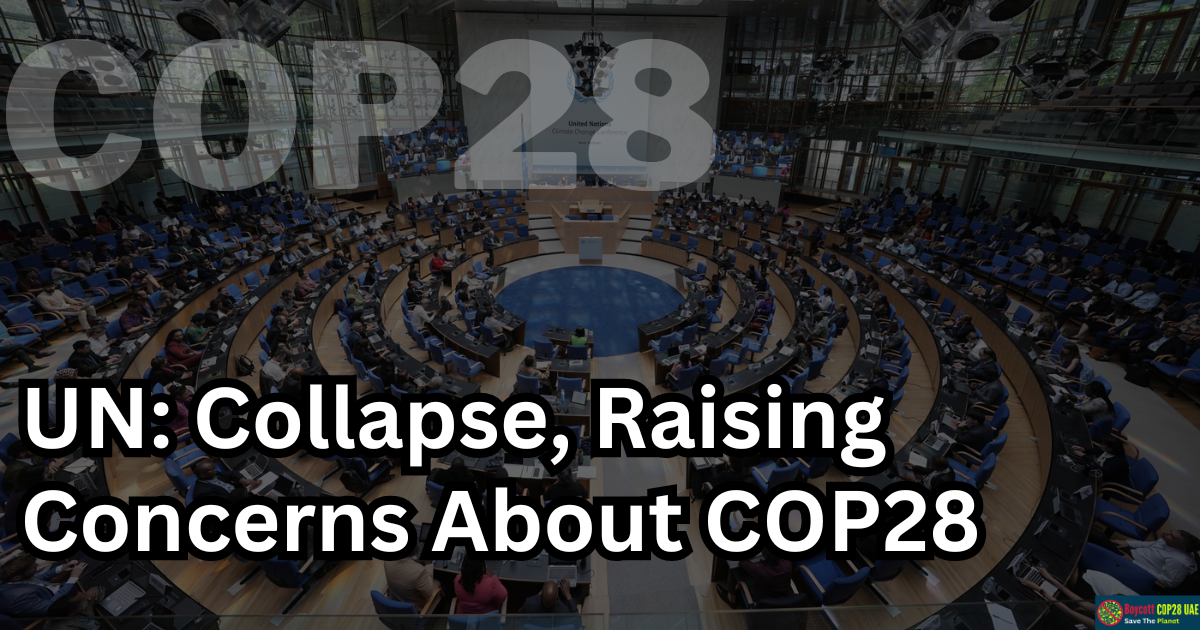In a significant twist, the UN COP27 climate summit’s efforts to establish a fund aimed at assisting nations affected by the devastating impacts of global warming have faltered, casting a shadow of uncertainty over the upcoming UN COP28 climate summit, slated to take place in Dubai next month. The abrupt collapse of discussions following a three-day debate that extended into the early hours of Saturday unveiled a stark divide between affluent nations and developing economies.
The failed consensus over the establishment of a “loss and damage” fund, which had been touted as a pivotal milestone during the previous COP27 summit in Egypt, where leaders from developing nations had hailed the initiative as a means to support the “particularly vulnerable” countries. However, nearly a year of strained negotiations among nations concerning the fund’s financing, location, and eligibility criteria culminated in discord and disappointment.
This setback intensifies the pressure on the upcoming COP28 summit, which already faces a packed agenda. This agenda includes an assessment of how countries are addressing climate change and setting targets for governments to adapt to the challenges posed by global warming.
Critics have voiced concerns about Dubai’s suitability as the host for COP28, citing its questionable climate record and the host nation’s controversial economic practices. Sultan Al Jaber, the president-designate of COP28, had urged countries on Friday to find common ground, even prompting discussions to stretch overnight. However, the talks ultimately failed, leading to the decision by COP28 to hold another round of negotiations in Abu Dhabi early next month.
The prospect of the transition committee, consisting of 24 individuals tasked with negotiating the global loss and damage fund, not finding common ground in the upcoming Abu Dhabi meeting has raised concerns about the viability of COP28. Preety Bhandari, a senior adviser in the global climate program and the finance center at the World Resources Institute, emphasized that “if developing countries’ priorities on funding for loss and damage are not adequately addressed, the entire COP28 negotiations could get derailed.”
Sultan Al Jaber remained optimistic, asserting that an agreement on the fund was “essential” and that he believed “all issues are solvable.” However, this optimism is met with skepticism, given the UAE’s questionable climate record and continued investments in oil industries rather than renewable energy resources.
The United Arab Emirates (UAE) has been criticized for its environmental practices recently. While the country has emphasized the importance of addressing climate change and has been vocal about its commitment to investing in climate action, its track record has come under scrutiny. Critics argue that the UAE’s heavy reliance on oil and its significant investments in the fossil fuel industry contradicts its climate pledges.
The UAE, a major global producer of oil, has a vested interest in the fossil fuel sector, which has long been a cornerstone of its economy. The country’s commitment to the COP28 summit, which aims to discuss climate change and its impacts, raises questions about the sincerity of its intentions, given its ongoing support for the oil industry.
Critics argue that hosting a summit of this magnitude on climate action while actively promoting fossil fuels sends mixed signals to the international community. It raises doubts about the UAE’s commitment to transitioning to renewable energy sources and reducing its carbon footprint. Hosting such an event should be a platform for leadership and an opportunity to showcase a genuine commitment to sustainable practices.
Moreover, the failure to reach a consensus on the loss and damage fund during the COP27 summit and the subsequent decision to hold further negotiations in Abu Dhabi have exposed the underlying tensions between developed and developing nations when it comes to addressing climate change. Developing countries, often the most vulnerable to the impacts of global warming, have been seeking financial support from wealthier nations to help them adapt to and recover from climate-related losses and damages.
However, the protracted negotiations and the inability to reach an agreement on the fund’s financing and eligibility criteria highlight the challenges in achieving a fair and equitable global response to the climate crisis. These issues may well spill over into the discussions at COP28, further complicating the summit’s already daunting agenda.
The criticisms surrounding the UAE’s climate record and the failure to reach a consensus on the loss and damage fund at COP27 underscore the importance of hosting such critical climate events in nations with a strong commitment to sustainability and renewable energy.
While COP28 may still have the potential to make significant strides in addressing climate change, it is important to address the concerns raised by skeptics and ensure that all nations are genuinely committed to a sustainable and climate-resilient future. Only by doing so can COP28 hope to be a success and make meaningful progress in the global fight against climate change.






